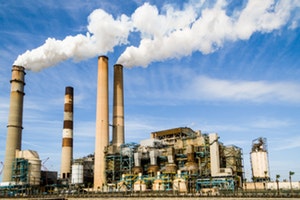Climate change already damaging health of world’s children and threatens lifelong impact
14 November 2019

Climate change is already damaging the health of the world’s children and is set to shape the wellbeing of an entire generation unless the world meets Paris Agreement targets to limit warming to well below 2˚C, according to a major new report published in The Lancet.
. The project is a collaboration between 120 experts from 35 institutions including the World Health Organisation (WHO), World Bank, University College London, and Tsinghua University.
For the world to meet its climate goals and protect the health of the next generation, the energy landscape will have to change drastically, and soon, the report warns. Nothing short of a 7.4% year-on-year cut in fossil CO2 emissions from 2019 to 2050 will limit global warming to the more ambitious goal of 1.5°C.
If the world follows a business-as-usual pathway, with high carbon emissions and climate change continuing at the current rate, a child born today will face a world on average 4˚C warmer by their 71st birthday, threatening their health at every stage of their lives.
As temperatures rise, harvests will shrink—threatening food security and driving up food prices in the decades ahead. Over the past 30 years, global yield potential of maize (-4%), winter wheat (-6%), soybean (-3%), and rice (-4%) has fallen. Infants and small children are among the worst affected by malnutrition and related health problems such as stunted growth, weak immune systems, and long-term developmental problems.
Dr Nick Watts, Executive Director of The Lancet Countdown said:
“Children are particularly vulnerable to the health risks of a changing climate. Their bodies and immune systems are still developing, leaving them more susceptible to disease and environmental pollutants.
“The damage done in early childhood is persistent and pervasive, with health consequences lasting for a lifetime. Without immediate action from all countries to cut greenhouse gas emissions, gains in wellbeing and life expectancy will be compromised, and climate change will come to define the health of an entire generation.”
Children will be particularly susceptible to infectious diseases that rising temperatures and changing rainfall patterns will leave in their wake. Over the past 30 years, the number of climatically suitable days for Vibrio bacteria (that cause much of diarrhoeal disease globally) have doubled. The threat is particularly high in the Baltic (with a record high of 107 suitable days in 2018) and in Northeast USA where the sea has been warming rapidly.
Spurred on by climate change, dengue is the most rapidly spreading mosquito-borne viral disease in the world. Nine of the 10 most hospitable years for dengue transmission have occurred since 2000, allowing mosquitoes to invade new territories across Europe. Around half of the world’s population are now at risk.
Through adolescence and into adulthood, a child born today will be breathing more toxic air, driven by fossil fuels and made worse by rising temperatures. This is especially damaging to young people as their lungs are still developing, so polluted air takes a great toll, contributing to reduced lung function, worsening asthma, and increasing the risk of heart attacks and stroke.
As global CO2 emissions from fossil fuels continue to rise (up 2.6% from 2016-2018), energy supply from coal is increasing (up 1.7% from 2016-2018), reversing a previous downward trend, while premature deaths related to PM2.5 remain stagnant at 2.9 million worldwide.
Livestock in the UK emitted 29 million tonnes of CO2 in 2016 (the most recent year for which data are available) from a range of factors such as fertilisers and feed production—equivalent to almost 40% of the CO2 from all power generated in the UK (despite a yearly 0.6% decline since 2000). Similarly, crop production released around 10 million tonnes of CO2 in 2016.
This might only be the tip of the iceberg, researchers say. PM2.5-related disease and premature death already costs the UK around £10 billion per year. If Europe were to experience PM2.5 at 2016 levels over the lifetime of the current population, economic losses and health costs in Europe could reach €129 billion a year.
Throughout their adult lives, extreme weather events will intensify
Later in life, a child born today will be put increased risk from severe floods, prolonged droughts, and wildfires. 152 out of 196 countries have experienced an increase in people exposed to wildfires since 2001-2004—resulting in direct deaths and respiratory illness as well as loss of homes, with a financial toll per person 48 times larger than flooding.
As the fourth hottest year on record, 2018 saw a record-breaking 220 million more over 65s exposed to heatwaves than in 2000 (63 million more than in 2017)—with older city dwellers with chronic health conditions in Europe and the Eastern Mediterranean most vulnerable to heat-related illness such as stroke and kidney disease.
As heatwaves become more frequent in the UK, the average number of heat-related deaths is expected to triple from 2,000 to 7,000 a year by the 2050s. With no requirements to prevent hospitals and care homes in the UK overheating in high temperatures, older people living in care homes are most at risk.
Despite the scale of the challenge, the report offers some reason for cautious optimism—growth in renewables accounted for 45% of total growth in power generation in 2018 (27% from wind and solar power), and low-carbon electricity accounted for a third of total electricity generation worldwide in 2016.
The Lancet Countdown authors call for bold action to turn the tide on the enormous health impact of climate change in four key areas:
- Ensuring high-income countries meet international climate finance commitments of US$100 billion a year by 2020 to help low-income countries.
- Making major investments in health system adaptation to ensure health damage of climate change doesn’t overwhelm the capacity of emergency and health services to treat patients.
Full link to paper: https://doi.org/10.1016/S0140-6736(19)32596-6
